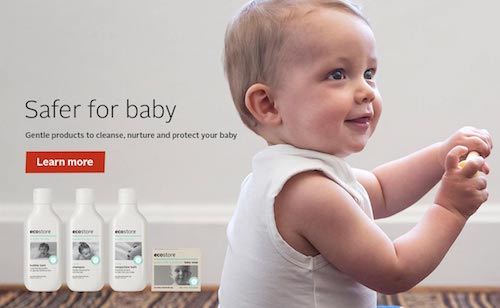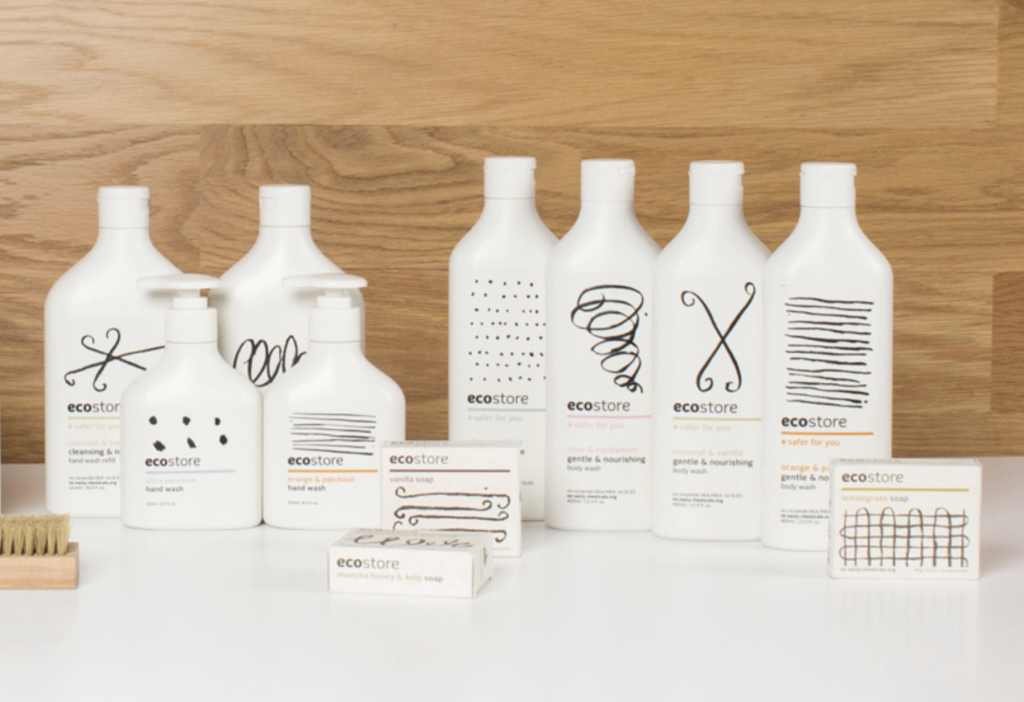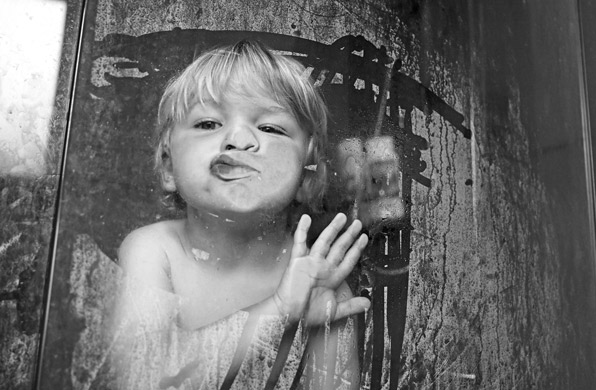Working together is a huge part of creating a better world, because the impact can be so much bigger and more positive. And when companies are making a difference through partnerships, it can inspire us to make decisions that help the environment at the same time. We’re profiling some of these cool businesses – check out The Paper Rain Project and the story of Indigo and Wills Greenlaw, whose skateboard art and fair trade, organic clothing gives back for good.
Tell us about yourselves and how The Paper Rain Project started.
I grew up in a remote community in the north west of Scotland (called Scoraig). It is still only accessible by boat and uses windmills and wells for electricity and water. My parents had a tree nursery and did the rural post run by boat and on foot (sometimes with one or two of us in a sheepskin-lined wheel barrow!). Having no fridge or washing machine, our parents worked very hard and fed us from the land. In 2001, our family of six moved to Picton, New Zealand, where our lifestyle completely changed. We still didn’t grow up with excess packaging and the use of plastic bags but there is always room for improvement in terms of waste management and consumerism in any family. Thankfully, there are becoming more and options!
Wills was brought up on a cherry farm in Marlborough with his two sisters. He grew up fishing and swimming in the river, climbing trees and helping to sell feijoas from the garage of their house. After school, he did an arborist apprenticeship (so still climbed trees!) and worked as such for several years. In 2012, he completed his Diploma in Therapeutic Massage in Wellington. This is where we met as I was studying part time (graphic design).
Our business was officially founded in May 2013 but had been a hobby for several years. I was 18 and studying Fine Arts at University of Canterbury when I painted my first longboard deck. I wanted to gift it to my then boyfriend and had come across a lovely guy (Chris of Kotahi Longboards) in Nelson who was shaping decks out of recycled waterskis. I continued to purchase these from Chris, custom paint them and sell them over the next three years before holding my first exhibition at Deluxe Cafe, Wellington in June 2013. Wills had been playing around with wine barrels and continued to develop our recycled barrel boards over the next few years.
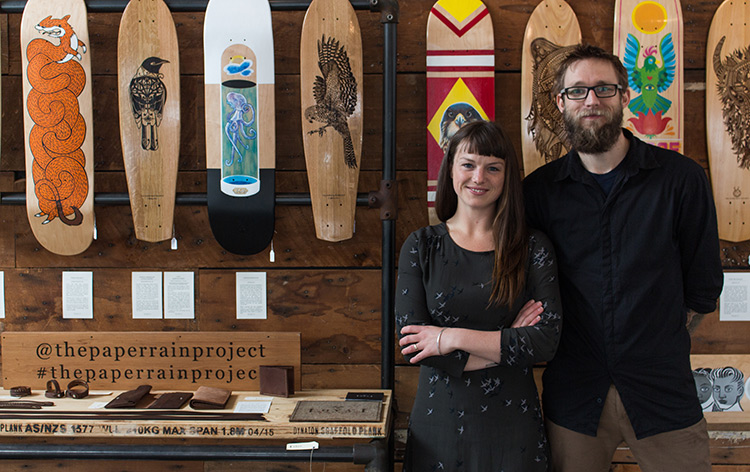
Most people would think of you as a social enterprise these days, was it always that way?
When we started, Paper Rain was just a business, not a social enterprise (it took me a few years to even hear of that term and I’m still not entirely sure if that is what we are!). However, the source of our materials was really important to us from the beginning. We began a relationship with Freeset, a New Zealand company based in Kolkata. This business exists purely to help women out of poverty and modern slavery. They use organic materials, pay living wages and have sewn our blank t-shirts for the last four years. As at November 2017, we had purchased over 9000 t-shirts from them. In terms of the boards, we wanted to use sustainably grown timber and wood that we recycle. Struggling to find used decks to paint for artwork, we have imported maple boards but will not do that again as we want to make every board from now on. We purchase barrels from several wineries, recycle available rimu from old houses and have developed a relationship with a Marlborough grower. Paul Millen, of Marlborough Timbers, has a small, sustainable woodlot of durable hard woods. From him, we purchase eucalyptus and blackwood as well as macrocarpa.
Initially we only thought to make our products using ethical sources (although we’d like to use hemp for our t-shirts and make them here, a better alternative to cotton). We have always supported charity events but early in 2015, began to create and stock a few products that donated some of their profits to various charities. This has grown from there.
There is enough ‘stuff’ in the world and a lot of it cuts corners in quality, ethics and the environment. If we were going to continue making things, we really felt like they had to do some good as well as ‘coming from good’. Now, every new t-shirt design and in-house board is paired with a cause and gives a percentage of profits with each sale. This is called our Cause Range. As yet, our business is not running at a profit itself. However, we believe that we will become profitable and continue with our belief in sustainability and support for worthy causes. We love the conversations driven by the artwork and causes we pair. For example, our ‘sloth’ t-shirt (with artwork by Nelson’s Monique Richards) is our current best seller and helps to support Live More Awesome. Live More Awesome exists to raise awareness and reduce the stigma around mental health. We chose the sloth to help raise conversation surround anxiety. Every time we sell this t-shirt, we talk about the cause and almost every single customer says “Oh, I can relate to that”. Conversation and awareness themselves also help the causes. Issues such as mental health need to be talked about by more people, more often!
By being a hopefully-super-approachable brand and producing products which people of many ages can relate to, we hope to help make the give-back-some model the given for business. You don’t have to give much, but the little bits add up and if every business gave just 1% from their sales, it would make a huge difference to the social and environmental needs of our country.
Do you have set sustainability and ethical business criteria for choosing your partners – the artists, other brands you sell, suppliers etc?
We are fussy with who we partner with and stock but we don’t have a written criteria as such. There is just Wills, myself and our assistant manager, Hannah, in the decision making process, so it’s easy for us to sit down and discuss things. We don’t bring in anything that is imported (unless it is fair trade) and support small New Zealand businesses and their trade. We currently stock La Petit Chocolat (chocolate made by a couple from Hawkes Bay), Say Yes To Adventure (a magazine which is a ‘give-back-some’ model itself and exemplifies the natural world), Jude Raffills Design (recycled rimu bottle openers) and more – but most we produce in-house. Our guest artists all seem to have passions for bettering our environment (e.g Cinzah and the SeaWalls Festival in which many of our guest artists par-take, Michel Tuffery and his years-long-ambition to raise awareness surrounding the issues of New Zealand waterways) and for social change (e.g Milarky re: belonging and social justice, Mica Still re: depression, endometriosis and sexuality, Jacqueline Macleod re: online and physical identity).
With the way we run our cause line now, we usually approach the artist with our intention to support a particular cause and the artwork is created from there (such as our Kakī Black Stilt Conservation t-shirt with Flox or our Conservation Kids NZ children’s t-shirt with Amane&Me.) Sometimes though, the cause is a derivative of the artwork (such as Hannah’s Batty’s Kete t-shirt in support of Satisfy Food Rescue or my Tui in support of Kaipupu Wildlife Sanctuary here in Picton).
None of us does everything perfectly right but the most important thing for us is that we, our collaborators, suppliers etc have their heart in the right place and are trying to create something positive.
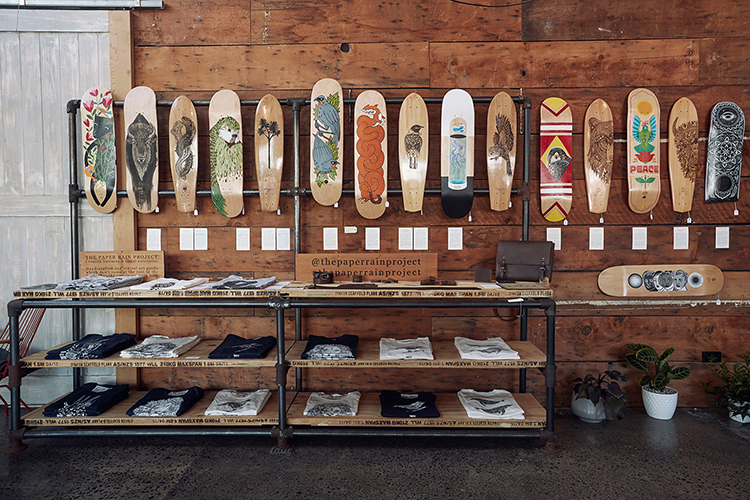
How would the wine barrels you use otherwise be disposed of and is this re-use and waste reduction element an important part of the business?
We purchase this material as a sustainable choice of wood to re-use instead of importing it. Many wine-barrels are cut in half and used for planters. We have seen barrels rotting outside sometimes but in truth they’re quite sought after for gardening. The material choice is about using a local resource, something that has had a unique life already and is not chemically treated (so can return to the Earth.) Again, if we are going to create more things in the World, we want to make as little a footprint as possible so re-using is something we are really passionate about. We need to work out paper bag options with our Courier and would love to make our clothes locally from materials more sustainable then cotton, but we are a work in progress and will continually try to improve what we are doing.
Has any individual or organisation especially inspired or helped you?
This is a big one! There are so many people who have inspired and helped us build Paper Rain. For one, the amazing guest artists with which we get to work. It’s a great community of exceptionally talented and lovely humans which we are very privileged to work with. We have always admired the pizazz, ethic and aesthetic of All Good / Karma Cola and of course, Ecostore. We read [ecostore founder] Malcolm’s book a few years ago and were saying “Yes! Yes!” the whole way through. However, Flight Coffee were one of the first younger brands which we found going right to the source. They have such an inspiring solidarity when it comes to their focus on quality and transparency and we admire them for that. It helps that they’re a lovely bunch too! Our t-shirt suppliers as well, the guys from Liminal Apparel & Common Good have helped us to develop by being generally amazing people to work with – they certainly have their hearts in the right place!!
For every decision and mistake we make, we learn so much and we have so many people to thank for that. Also, we could never do a thing if it weren’t for our awesome customers who continually (through their purchases but also through their verbal support) see us through the hard times when our spirits are low.
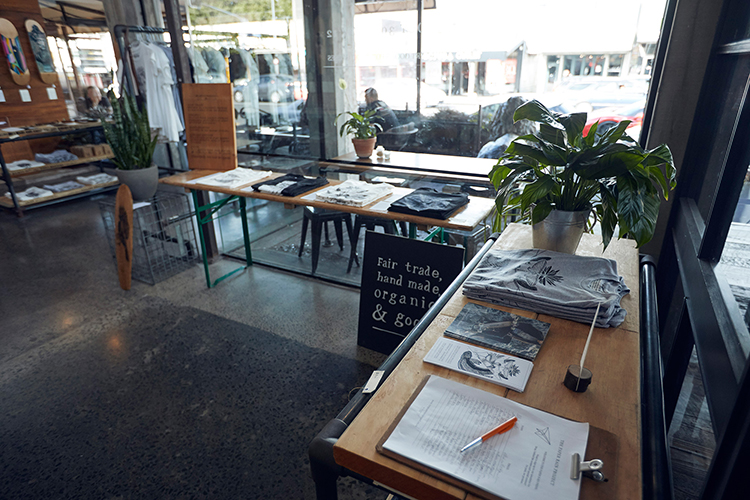
How has partnership made a difference in your business and made your impact bigger than it could be on your own?
Our business is built upon collaboration and partnership. Although we do many of our artworks in-house, we partner with many artists to create what we do. Each of them has their own style which different customers are drawn to. With the new Cause range, having the artist, our business and the cause/charity on board themselves, we are able to reach a much wider audience. With our boards too, we have partnered with wineries – namely Seresin Estate and more recently, Framingham Wines. Both companies have helped get behind our barrel board artworks by helping us to source barrels, showcase work and sponsoring our various events (thank you!). In 2015, we partnered with Renaissance Brewing to make a barrel-aged beer (The Woodsman). We then made barrel boards from those barrels (donated by Seresin) while the brewery produced a milk stout. We did the label design free and created a range of native plant illustrations in-house. Together, we donated $1 per beer and $25 per board sold to the native rehabilitation of our local wetlands.
We think collaboration and partnership is at the backbone of success. There are so many like minded people out there and with so many different skill sets, we’re all bound have a bigger, wider and more positive impact together.
Which causes do you think you’ve made the most meaningful difference to?
In all honesty, we don’t know exactly what the causes use the money for and trust them to use it towards what they most need. While we’d love to think that every penny goes towards planting a physical tree for example, the truth is that many of the projects we support (Marlborough Falcon Trust, Kaki Recovery, Conservation Kids NZ, Satisfy Food Rescue etc) are more grass roots projects and they need money just to stay afloat. The biggest difference we have made is through supporting Freeset to give employment options to women from backgrounds of poverty and sex slavery in India. Our purchases have so far equated to 1414 days of fairly paid employment for these women, who would otherwise have little choice. This equates to 5.9 years of employment for one woman. We’d love to make enough difference with our donations – become big enough and stick around long enough – to see quantifiable positive effects within the charities we support, but also appreciate that many of them do not have time to report back to us about where they spend it.
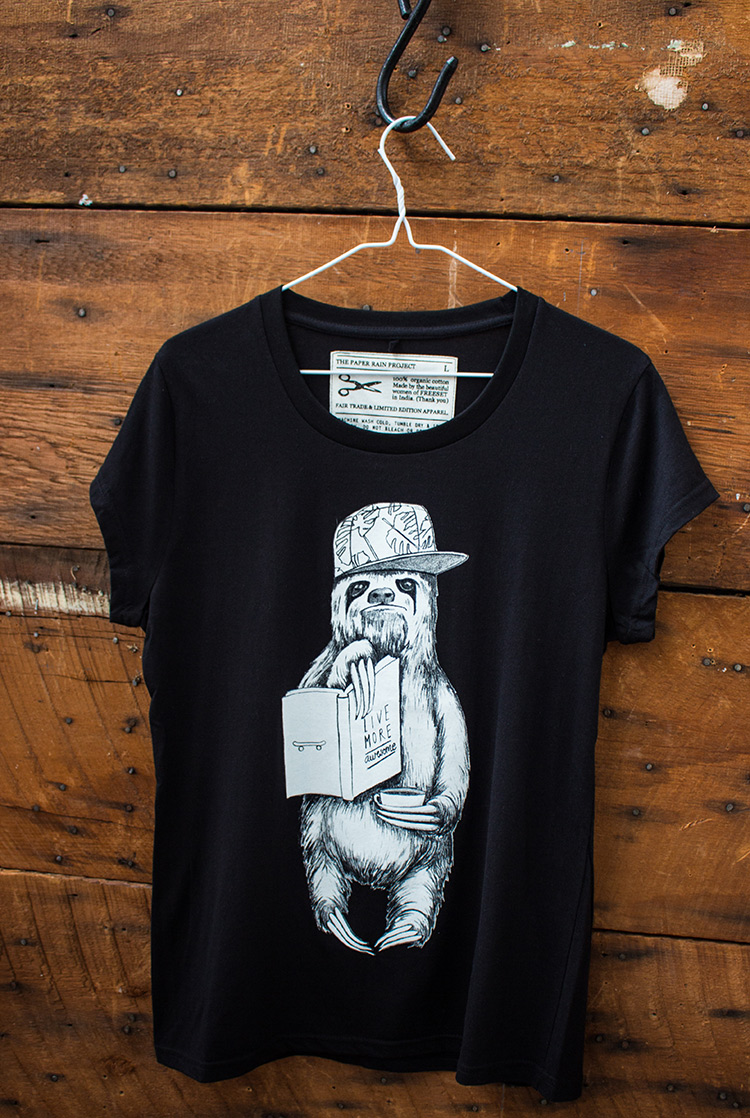
Alongside awareness, how much have you raised for the causes and charities you’ve supported through profit donation?
As a young company, pre-2017 our donations were often events based. When and where we could, we’ve donated our products to local charities in the form of t-shirts and wine-barrel art boards (we estimate $5000 of product since 2013). Our first ventures into pairing a specific product and profit with charities were with artist, Lizzie Thomas/Ellaquaint in the creation of a 1 of 1 Maui skateboard artwork which donated $250 to Maui conservation & The Black Dog t-shirt (2015) from which we donated $500 to Live More Awesome. We also did free illustration and design work to the value of $1000 for the National Whale Centre. Furthermore, we raised around $2000 for the native rehabilitation of local Wetlands through our partnership with Renaissance Brewing and our Woodsman series of beer & barrel-board artworks (2015 – 2017).
Spring 2017 marked the official beginning of our Cause Range. We currently have 8 Cause wine-barrel board artworks which donate $25-$50 each towards a charity. 3.5% of each t-shirts’ profit goes to charity (as well as the tee artworks themselves supporting the conversation around the great initiatives they represent.) There is also a great deal of marketing time & money involved in promoting the products and causes including professional photo shoots with Cause ambassadors such as artist, Michel Tuffery, Flight Coffee & musician, Louis Baker. In saying this, our business has only just turned it’s first small profit in April 2017. Given that we have donated $1700 from Aug-Oct this year, that’s almost the whole profit as a business from the last financial year (we are still not taking a wage). While we will to do more, we are still a fledgling business (with 2 directors and one staff member) and need to make Paper Rain financially sustainable in order to do bigger and better things.
More personally, we want to get more hands on and spend less time in the office. This is coming in the form of doing the training to become Project Jonah and Kiwi Conservation Volunteers, doing trap lines for Picton Dawn Chorus and volunteering with Conservation Kids NZ/Spring Clean Ups.
What are your goals and plans for The Paper Rain Project?
At this point we think our business needs simplification – stripping back to the things that actually work. We’d love to partner with a larger ethical business to collaborate and get our Cause range out to as many places as possible to have more effect (and keep our business doing what it’s trying to do). We may have to change the limited edition nature of our t-shirt designs for more potential gains for the Cause each supports. Board wise, Wills is developing rideable boards made from eucalyptus and blackwood to complement our art range of decks. We are looking forward to next year when our full range of boards will become made in-house. In terms of the physical business, we close up the Picton store in March 2018 and will become a mostly online entity. This will free us up – both physically and financially – to do more pop up stores and events – personally getting behind our product in more locations. On the whole, we’re not entirely sure what the future holds for us – or Paper Rain, however we are hope that our approach to a sustainable and ethical business model is the right one – and therefore will survive and prosper!
Photography: Emma Pickles, Rachael Brown Photography
Video: Ben Sarten Imagery.

